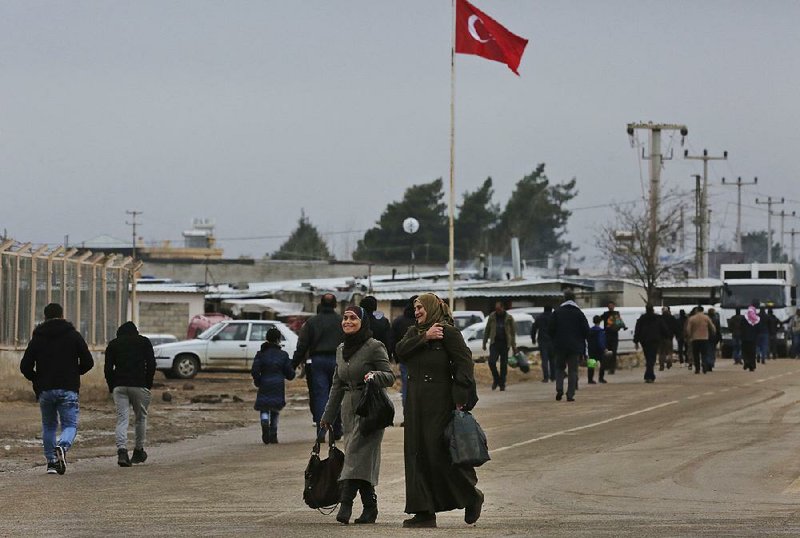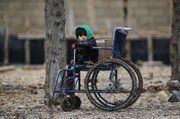ANKARA, Turkey -- Turkish President Recep Tayyip Erdogan on Friday vowed to expand Ankara's operation in a Kurdish enclave in northern Syria eastward, toward the border with Iraq.
In Vienna, the Syrian opposition and Russia agreed to a cease-fire to halt the fighting over the besieged eastern Ghouta suburbs of Damascus, an area the U.N. has called the "epicenter of suffering" in the war-torn country.
The agreement, confirmed by opposition official Ahmad Ramadan, is contingent on Russia compelling the government to allow aid flow to the suburbs, according to the Syrian Observatory for Human Rights monitoring group. Russia is a key ally of Syrian President Bashar Assad.
Rebels gave the government 24 hours to comply, said Ammar Hassan, spokesman for the Islam Army, one of the factions fighting in the area. The government did not sign the agreement, said opposition adviser Omar Kouch.
The eastern Ghouta area has seen more than two months of violent fighting since rebels tried to ease a choking government blockade that has depleted food and medical supplies.
The U.N. reported in November that child malnutrition in eastern Ghouta was at the worst ever recorded throughout the seven years of civil war. It estimates there are around 400,000 people trapped under the government's siege.
Conditions deteriorated precipitously after pro-government forces choked off the last smuggling tunnels leading to the opposition-held suburbs in May.
A "de-escalation" agreement brokered by Russia, Iran, and Turkey in August failed to bring any relief. The government and rebels eased up on their fighting, but the government refused to allow aid into eastern Ghouta contravening the agreement.
Fighting broke out again in November, leading the government to pound the enclave with airstrikes and artillery fire without distinguishing between civilian and military targets. Rebels have responded with waves of shelling on Damascus. At least 286 civilians have been killed in the crossfire in the past month alone, according to figures from the Observatory.
The agreement, the latest in a long line of short-lived truces for Syria, was announced on the second and last day of a U.N.-mediated round of peace talks in the Austrian capital. Another round, mediated by Russia, starts in Sochi on Monday.
Also on Friday, U.N. Secretary-General Antonio Guterres called on the Security Council to refer Syria to the International Criminal Court, pointing to "serious violations" including blocking aid deliveries and medical care to millions in need.
Guterres said in a report to the council circulated Friday on the humanitarian situation in Syria in December that "accountability for serious violations is a requirement under international law and central to achieving sustainable peace."
In December, he said, no aid was delivered to over 417,000 people in nine "besieged" locations.
Erdogan said the Turkish forces' push into Afrin would stretch farther east, to the Syrian Kurdish town of Manbij, and toward the border with Iraq "until no terrorist is left."
Erdogan's latest comments appeared to be in defiance of the United States, which has urged Turkey to keep its campaign in Syria "limited in scope and duration" and to focus on ending the war.
Turkey considers the Syrian Kurdish forces, known as the People's Protection Units to be a terrorist group because of their purported links to Kurdish insurgents in Turkey. Manbij is held by the Syrian Democratic Forces, which is dominated by the People's Protection Units. U.S. troops are not present in Afrin but are embedded with the Syrian Democratic Forces in other parts of Syria, where they are working to prevent a resurgence of the Islamic State group.
"We will clear Manbij of terrorists ... No one should be disturbed by this because the real owners of Manbij are not these terrorists, they are our Arab brothers," Erdogan said, "From Manbij, we will continue our struggle up to the border with Iraq, until no terrorist is left."
Ankara's push into Manbij would put Turkish troops in proximity to American soldiers there.
Erdogan's remarks came on the seventh day of the Turkish incursion into Afrin, which started last Saturday.
Meanwhile, Turkey's Health Minister Ahmet Demircan said on Friday that the operation into Afrin had led to 14 deaths on the Turkish side. Three Turkish soldiers and 11 Syrian opposition fighters allied with them were killed in fighting since Jan. 20, he said. Some 130 others were wounded.
The Syrian Democratic Forces said the first week of Turkey's incursion had left more than 100 civilians and fighters dead. The group said in a statement Friday that among the dead are 59 civilians and 43 fighters, including eight female fighters. At least 134 civilians were wounded in the weeklong clashes, it added.
Turkey's military said at least 343 "terrorists" have been "neutralized" during the campaign, a figure the Syrian Kurdish militia dispute.
In his speech, Erdogan slammed the U.S. alliance with the Kurdish forces in Manbij and other parts of Syria.
"Our greatest sadness is to see these terrorist organizations run wild holding U.S. flags in this region," Erdogan said.
Erdogan said President Donald Trump asked him "not to criticize us so much" during their telephone call on Wednesday.
"OK," said Erdogan, citing what he said he told Trump in the conversation. "But how can a strategic partner do such a thing to its strategic partner?"
Erdogan also accused the Syrian Kurdish militia of using civilians as human shields in Afrin to try to slow down the advance of the Turkish forces and of the Turkish-backed Syrian opposition fighters.
He also criticized calls by U.S. and other allies for a quick resolution of Turkey's incursion, saying military interventions in places in Afghanistan and Iraq lasted for several years.
Information for this article was contributed by Bassem Mroue and staff members of The Associated Press.
A Section on 01/27/2018

